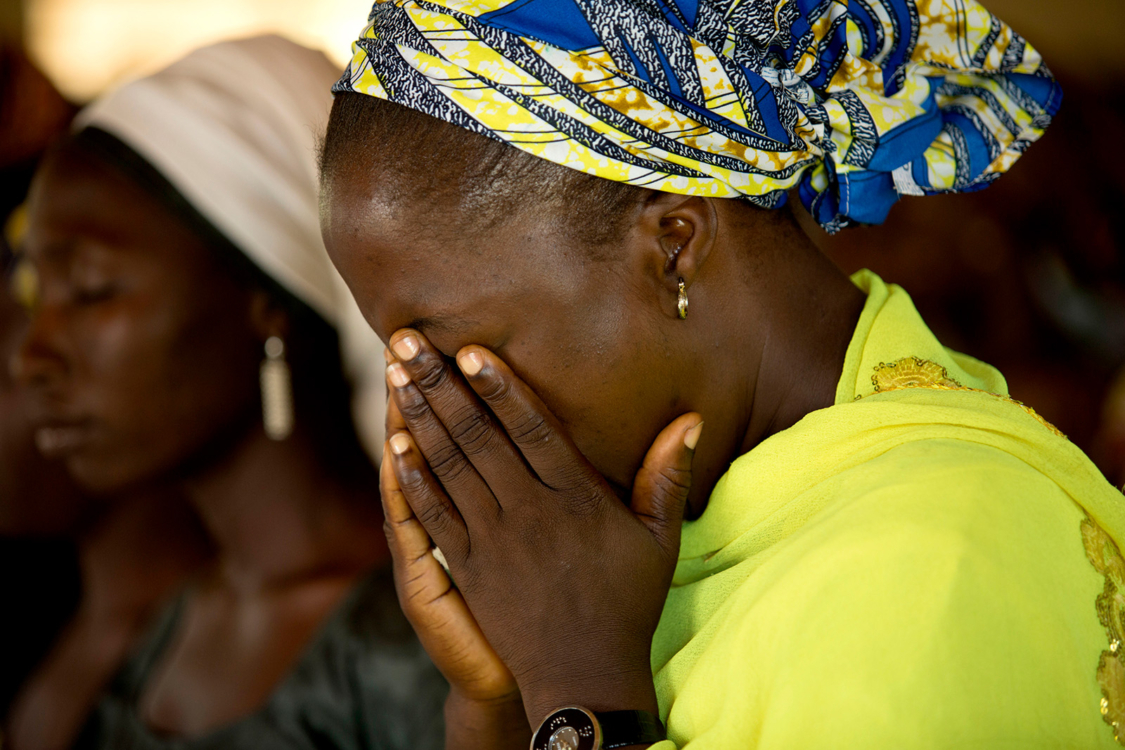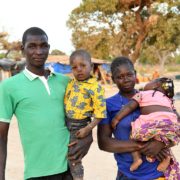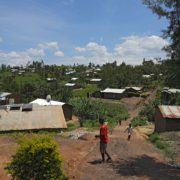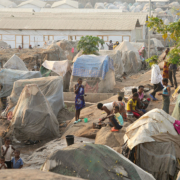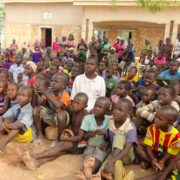The world’s youngest Church is under siege
The often unrecognized, yet devastating effect of this violence on the Church demands urgent attention. Christians, containing the world’s highest number of people below 25, are regularly the preferred target of jihadist groups. Sub Saharan Christians are some of the world’s most resilient, courageous, and committed to spreading the Good News of Jesus. But they are also among the most vulnerable because of violence. They Global Church must unite in urgent prayer and action for them.
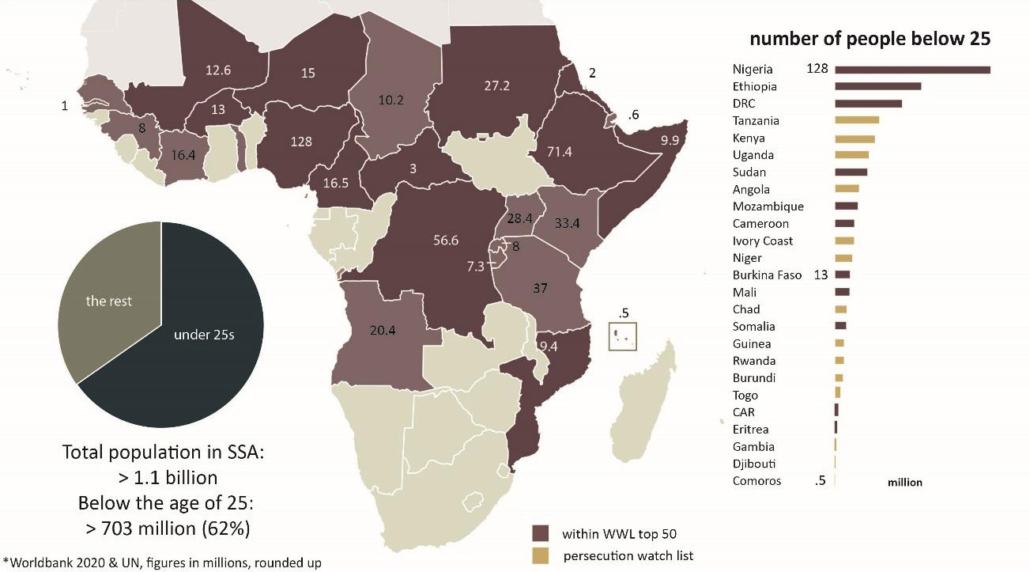
The median age in Sub Saharan Africa is only 20, and 62% of the population are under 25. With youths between 15 and 24 nearing 200 million, this is the largest generation our region has ever had to raise. Youth’s presence as prerequisite for the future of the church, goes without saying. Because of the large percentage they represent, youths are also the most affected by the growing, often violent, persecution in Africa.
Violence in Sub Saharan Africa (SSA) is at an all-time high. According to the 2024 Global Terrorism Index The epicentre of terrorism has shifted from the Middle East and North Africa into sub-Saharan Africa, concentrated largely in the Sahel region. This region now accounts for almost half of all deaths from terrorism globally.
- Total deaths from terrorism are now considerably higher in sub-Saharan Africa than any other region. Sub-Saharan Africa has recorded the most deaths from terrorism for the past seven years.
- Burkina Faso became the country with the highest impact from terrorism for the first time, with deaths from terrorism increasing by 68 per cent to 1,907. A quarter of all terrorism deaths occurring globally were in Burkina Faso.
- Islamic State (IS) and its affiliates remained the world’s deadliest terrorist group in 2023
- Terrorist groups and organised crime organisations usually interact in three ways: they can coexist, cooperate, or converge into a single group. The nexus between organised crime and terrorism in the Sahel is characterised by activities such as cattle and livestock rustling, artisanal gold mining, drug trafficking, kidnapping, and ransom demands
The general impact has been devastating – by Dec 31, 2023, a staggering nearly 13.5 million people have been newly displaced by violence in SSA, and people find it harder and harder to make even the most basic of livings. This figure brought to 34.8 the number of people that are living in displacement. This is 46% of the global total.
What has been the effect on the Church and individual believers?
In the Sahel region alone, there are 6 countries within the first 20 on Open Doors’ 2025 World Watch List (WWL). Of the top 20 places where Christians faced the most violence for their faith, 13 were in SSA.
According to the 2025 WWL data1 at least:
- 4,192 Christians were killed for their faith in SSA. 3,1000 in Nigeria alone.
- 2,040 Christians sexually violated for their faith in this region.
- 3,358 Christians abducted for their faith in SSA (2,830 in Nigeria alone).
The effect of the violence has been devastating for the Church, including:
- Spiritual effects: the inability to respond to every-day challenges in a Biblical way, a return to Africa Traditional Religions and/or radicalised belief systems. They warn that the very presence of the Church in these strategic regions is being challenged.
- Emotional effects: trauma (individual and collective), anger and retaliation, cycles of violence, despondency.
- Physical effects: death, injury, displacement, long-term stress related health issues.
- Socio–economic effects: loss of livelihood (and as a result hunger, lack of education, social demise, idleness), loss of property (lack of shelter and increasingly facing squalor), spreading poverty.
What are the root causes of the continued violence against Christians in SSA?
According to our analyses, this is due to external and internal vulnerabilities:
- External vulnerabilities
- There is a lack of state protection. This is because of weak state institutions, the fact that sharia is run formally or informally in many of these societies, and the fact that informal institutions led by sheiks, imams and traditional rulers often wield more power than state authorities.
- Impunity: No one is held accountable for violence against Christians. There is lack of due legal processes, which is often driven by the prevailing ideology (see below).
- Ideology: Many leaders (formal and informal) in these regions ascribe to the concept of Dar al Islam under which Christian lives are worth less than Muslim lives, and the former are expendable. This is also part of the worldwide radicalization trend.
- Internal vulnerabilities
- Christian theology: Christians regularly have a weak view on the power, value of and calling towards advocacy. Engaging in politics, journalism or law is often regarded as being carnal.
- The need outweighs the capacity to respond: The scale of the crisis is beyond the ability of the church to provide help and address root causes. Additionally, Christians in many of the countries that are affected by jihadist violence, or can expect it soon, are ill-prepared for it.
Why is there insufficient acknowledgement from the global community?
The Church, media, governments, and civil society (local, national, international) do not sufficiently acknowledge or act to stop violence and its effects on Christians in SSA due to:
- A lack of knowledge: they are not informed about, or convinced that there are religious drivers with consequences for freedom of religion, and may not have easy access to reliable data.
- A feeling of helplessness over the lack of an obvious solution to the problem. We believe, however, that change is possible through prayer and appropriate action.
- The cost of acting is too high: There is lack of support to Christians from local authorities. Governments are also unwilling to risk financial and human resources to address the issue. Religion-based crises or their drivers are also sensitive topics.
- There are those who feel that the problem does not directly affect them.
Why is the situation urgent?
The Church in Africa is the biggest and youngest 2Church on earth. But there is an unprecedented onslaught against them. Our data3 shows that it is getting worse. GTI confirms this, pointing out that violence in SSA was already ten times worse in 2021 than in 2007.
We cannot simply stand by and watch as the situation continues to deteriorate across the African continent. The cost of inaction is simply too high: if, for instance, Nigeria should collapse, the consequences would be enormous. This is the country with the biggest GDP in Africa. It is one of the most influential states in Africa and a collapse there will introduce a tsunami of economic and security crises across the wider region and force floods of migrants to seek better lives elsewhere.
The very presence of the Church in strategic areas is at risk. Large areas of the DRC where the ADF is active have been stripped of their Christian presence; large areas of Burkina Faso are now also without any Christians (There are church building, but they are empty because nearly all the Christians have fled.)
Arise Africa!
“Arise, shine, for your light has come, and the glory of the Lord rises upon you. See, darkness covers the earth and thick darkness is over the peoples, but the Lord rises upon you and his glory appears over you. Nations will come to your light, and kings to the brightness of your dawn.
Isaiah 60:1
ServAfrica, in partnership with Aflame, the Association of Evangelicals in Africa, Open Doors and others, have embarked on a multi-year campaign with the vision that the global community acknowledges and acts against the extreme violence and supports the church to persevere and be resilient, resourceful, and influential.
We call upon the global community to ensure that Christians and other vulnerable individuals in Sub-Saharan Africa are treated with dignity and respect by:
- Protection: Providing robust protection from violent militant attacks
- Justice: Ensuring justice through fair prosecutions of the attackers
- Restoration: Bring healing and restoration to all affected communities
Our goal is to raise 1 million prayers and petitions in solidarity with Christians affected by violent persecution on the continent? Will you join us?
Footnotes:
1WWL2023: confirmed cases only, figures are likely much higher. Each case likely represents several more.
2 Has the largest number of youths below 25 years of age
3 See WWL2023 violence article

